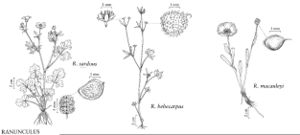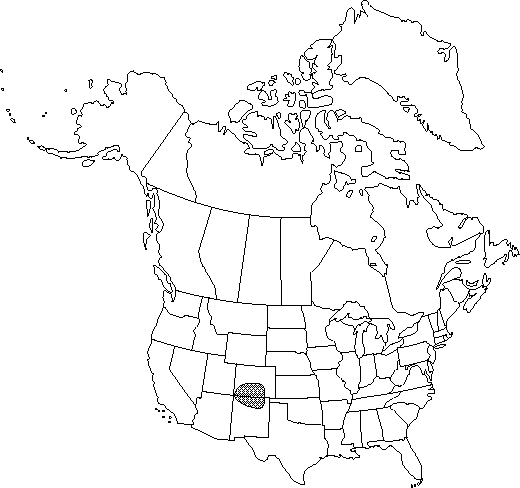Difference between revisions of "Ranunculus macauleyi"
Proc. Amer. Acad. Arts 15: 45. 1879.
FNA>Volume Importer |
imported>Volume Importer |
||
| (7 intermediate revisions by 2 users not shown) | |||
| Line 12: | Line 12: | ||
}}{{Treatment/ID/Special_status | }}{{Treatment/ID/Special_status | ||
|code=F | |code=F | ||
| − | |label= | + | |label=Illustrated |
}} | }} | ||
|basionyms= | |basionyms= | ||
| Line 23: | Line 23: | ||
}}<!-- | }}<!-- | ||
| − | --><span class="statement" id="st- | + | --><span class="statement" id="st-undefined" data-properties=""><b>Stems </b>erect from short caudices, 6-15 cm, glabrous or sometimes pilose, each with 1-2 flowers. <b>Roots</b> slender, 0.7-1.3 mm thick. <b>Basal</b> leaves persistent, blades narrowly elliptic to lanceolate or oblanceolate, undivided, 1.5-4.5 × 0.5-1.1(-2.8) cm, base acute or long-attenuate, margins entire except for apex, apex truncate or rounded and 3(-5)-toothed. <b>Flowers</b>: pedicels glabrous or brown-pilose; receptacle glabrous; sepals 6-12 × 2.5-8 mm, abaxially densely brown-pilose; petals 5(-8), 10-19 × 6-17 mm; nectary scale glabrous. <b>Heads</b> of achenes ovoid or cylindric, 5-10 × 4-5.5 mm; achenes 1.5-1.7 × 1.2-1.3 mm, glabrous; beak slender, straight or recurved, 0.5-1.5(-2.2) mm.</span><!-- |
-->{{Treatment/Body | -->{{Treatment/Body | ||
| Line 30: | Line 30: | ||
|elevation=3300-3700 m | |elevation=3300-3700 m | ||
|distribution=Colo.;N.Mex. | |distribution=Colo.;N.Mex. | ||
| − | |discussion=<p>The type specimen of Ranunculus macauleyi var. brandegeei L. D. Benson, from the Sangre de Cristo Mountains, Colorado, differs from typical R. macauleyi in its tall stem, broad, crenate-laciniate leaves, and sepals with pale or transparent hairs. These characteristics are suggestive of R. inamoenus, and the plant may be of hybrid ancestry.</p> | + | |discussion=<p>The type specimen of <i>Ranunculus macauleyi</i> <i></i>var.<i> brandegeei</i> L. D. Benson, from the Sangre de Cristo Mountains, Colorado, differs from typical <i>R. macauleyi</i> in its tall stem, broad, crenate-laciniate leaves, and sepals with pale or transparent hairs. These characteristics are suggestive of <i>R. inamoenus</i>, and the plant may be of hybrid ancestry.</p> |
|tables= | |tables= | ||
|references= | |references= | ||
| Line 39: | Line 39: | ||
-->{{#Taxon: | -->{{#Taxon: | ||
name=Ranunculus macauleyi | name=Ranunculus macauleyi | ||
| − | |||
|authority=A. Gray | |authority=A. Gray | ||
|rank=species | |rank=species | ||
| Line 53: | Line 52: | ||
|publication title=Proc. Amer. Acad. Arts | |publication title=Proc. Amer. Acad. Arts | ||
|publication year=1879 | |publication year=1879 | ||
| − | |special status=Endemic; | + | |special status=Endemic;Illustrated |
| − | |source xml=https:// | + | |source xml=https://bitbucket.org/aafc-mbb/fna-data-curation/src/2e0870ddd59836b60bcf96646a41e87ea5a5943a/coarse_grained_fna_xml/V3/V3_521.xml |
|genus=Ranunculus | |genus=Ranunculus | ||
|subgenus=Ranunculus subg. Ranunculus | |subgenus=Ranunculus subg. Ranunculus | ||
|section=Ranunculus sect. Epirotes | |section=Ranunculus sect. Epirotes | ||
|species=Ranunculus macauleyi | |species=Ranunculus macauleyi | ||
| − | |||
| − | |||
| − | |||
| − | |||
| − | |||
| − | |||
| − | |||
| − | |||
| − | |||
| − | |||
| − | |||
| − | |||
| − | |||
| − | |||
| − | |||
| − | |||
| − | |||
| − | |||
| − | |||
| − | |||
| − | |||
| − | |||
| − | |||
| − | |||
| − | |||
| − | |||
| − | |||
| − | |||
| − | |||
| − | |||
| − | |||
| − | |||
| − | |||
| − | |||
| − | |||
| − | |||
| − | |||
}}<!-- | }}<!-- | ||
-->[[Category:Treatment]][[Category:Ranunculus sect. Epirotes]] | -->[[Category:Treatment]][[Category:Ranunculus sect. Epirotes]] | ||
Latest revision as of 21:49, 5 November 2020
Stems erect from short caudices, 6-15 cm, glabrous or sometimes pilose, each with 1-2 flowers. Roots slender, 0.7-1.3 mm thick. Basal leaves persistent, blades narrowly elliptic to lanceolate or oblanceolate, undivided, 1.5-4.5 × 0.5-1.1(-2.8) cm, base acute or long-attenuate, margins entire except for apex, apex truncate or rounded and 3(-5)-toothed. Flowers: pedicels glabrous or brown-pilose; receptacle glabrous; sepals 6-12 × 2.5-8 mm, abaxially densely brown-pilose; petals 5(-8), 10-19 × 6-17 mm; nectary scale glabrous. Heads of achenes ovoid or cylindric, 5-10 × 4-5.5 mm; achenes 1.5-1.7 × 1.2-1.3 mm, glabrous; beak slender, straight or recurved, 0.5-1.5(-2.2) mm.
Phenology: Flowering late spring–summer (Jun–Aug).
Habitat: Sunny open soil of alpine meadows and slopes
Elevation: 3300-3700 m
Discussion
The type specimen of Ranunculus macauleyi var. brandegeei L. D. Benson, from the Sangre de Cristo Mountains, Colorado, differs from typical R. macauleyi in its tall stem, broad, crenate-laciniate leaves, and sepals with pale or transparent hairs. These characteristics are suggestive of R. inamoenus, and the plant may be of hybrid ancestry.
Selected References
None.

